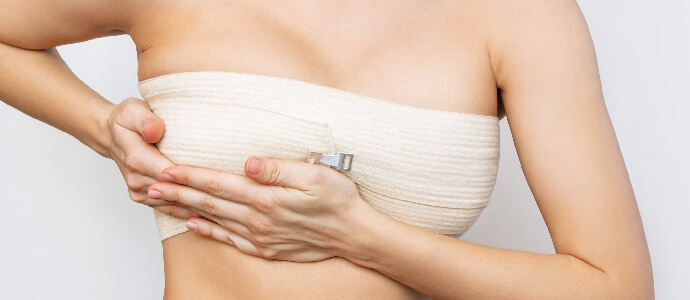Plastic surgery has become more and more commonplace in recent years and breast augmentation is an especially popular procedure. Brian D. Cohen, MD, who is an expert in this field, has operated on women in Great Neck, throughout Nassau County, and in Manhattan with impressive outcomes. All of his patients have questions about recovery as well as about results.
If you are considering breast augmentation or have already decided to undergo the procedure, contact Dr. Cohen in Great Neck or Manhattan to discuss your options. You will find his reputation for surgical skill, artistry and genuine concern for those he treats is well-deserved.
How long does recovery from breast augmentation typically take?
Although you are no doubt excited about the many benefits of breast augmentation, you should be aware that the procedure will require a bit of downtime. It pays to remember that every woman is unique. You know your own body and its recuperative powers better than anyone,
so you should take this information into account when planning for the procedure.
It is realistic to anticipate feeling tired and sore for a few days after surgery. Depending on your stamina and how you handle pain, you may be able to return to work in a week or two, assuming your work does not involve strenuous activity. All the surgical stitches are dissolvable. Any pain, inflammation or tenderness you experience at first will soon fade, as will any scars.
Bear in mind that breast augmentation is a choice and an investment; be patient to reap its full benefits.
The Stages of Healing
All surgery exhausts the body to some degree and, as noted, reactions vary from person to person. Nonetheless, every woman will go through the following stages of recovery:
- Immediately after breast augmentation surgery you will be groggy from anesthesia and sore from the operation. You should arrange for a ride home from the surgical facility and plan to have someone stay with you overnight.
- 24 hours after surgery is typically the most uncomfortable time for patients. Dr. Cohen will remove your dressings, except for the steri-strips and skin tape that cover your incisions. He will also likely either administer an injection or prescribe oral medication for your discomfort. Expect to feel tightness in the chest as your body adjusts to the implants, and to have mild bruising and swelling. As part of your recovery, Dr. Cohen will instruct you in massaging your breasts to prevent capsular contracture.
- 1 to 2 weeks after surgery you will feel much like your old self, but should be careful to take things easy so as not to interfere with the healing process. Not pushing yourself will actually shorten your recovery time. After a week you will be able to shower and to begin resuming a routine that includes light exercise. Though your pain will have greatly lessened, and swelling will have noticeably decreased, Dr. Cohen still advises you to avoid rigorous workouts.
- 2 months after surgery most patients feel pretty much past the breast augmentation procedure, but again, not everyone heals at the same rate. While postsurgical bruising will fade and disappear during the first week and pain will slowly decrease, it may take as long as 6 months for surgical scars to fade. Our office will recommend follow-up visits so that Dr. Cohen can make certain your healing is taking place just as it should.
Patients often ask what they can do to speed their recovery from breast augmentation so we will address that issue next.
How to Make Your Recovery from Breast Augmentation Go Smoothly
In order to give yourself the best chance of gliding through the recovery process, take the following suggestions to heart:
- Make sure to get enough rest and plenty of sleep
- Stay well-hydrated — drink water throughout the day (always a good idea)
- Take pain medication as prescribed — toughing it out may increase your blood pressure and make sleep more difficult
- Avoid lying or sleeping on your stomach (which could dislocate your implants) and use small pillows to maintain a comfortable position
- Eat a healthy diet — proper nutrition (plenty of vegetables, few fatty or sugary foods) will help you heal so it’s a good idea to stock up on easy-to-prepare food prior to surgery
- Protect yourself from the sun — sun exposure will not only darken your scars but may slow your recovery
- Don’t overexert yourself through vigorous exercise or heavy lifting
- Don’t smoke before or after the procedure — stop smoking at least 45 days before your breast augmentation and do not restart since nicotine causes blood vessels to constrict & may cause complications
- Do not wear an underwire bra which will not only be uncomfortable after surgery but may also irritate incisions, possibly risking infection and making scars more visible
In addition to these caveats, when you are considering breast augmentation surgery you should be aware that this procedure will make future mammograms more difficult to read. Also, it is best to postpone breast augmentation until you no longer plan to have children because the procedure may make it difficult or impossible to nurse.
Contact Breast Augmentation Expert Dr. Brian D. Cohen Today
Before you have a breast augmentation, or for that matter any surgical procedure, it’s important to understand in detail what the recovery period will be like. Contact our Great Neck or Manhattan office to make an appointment with Dr. Cohen. You will find him dedicated and caring, ready to give you the personal attention you deserve.

